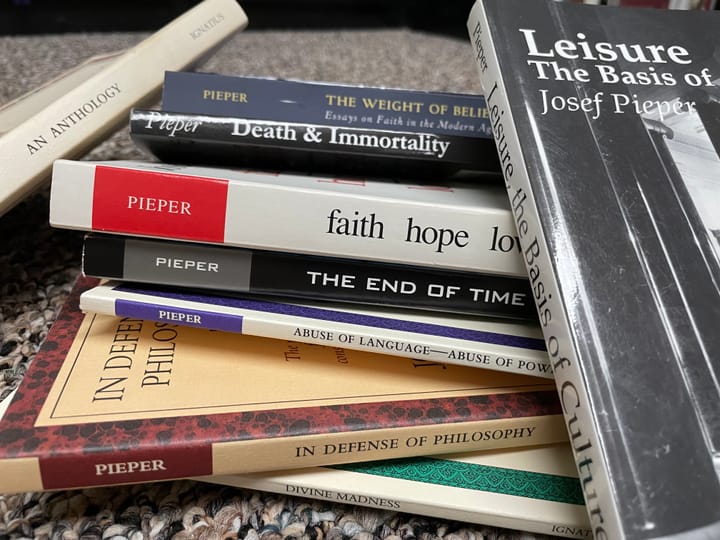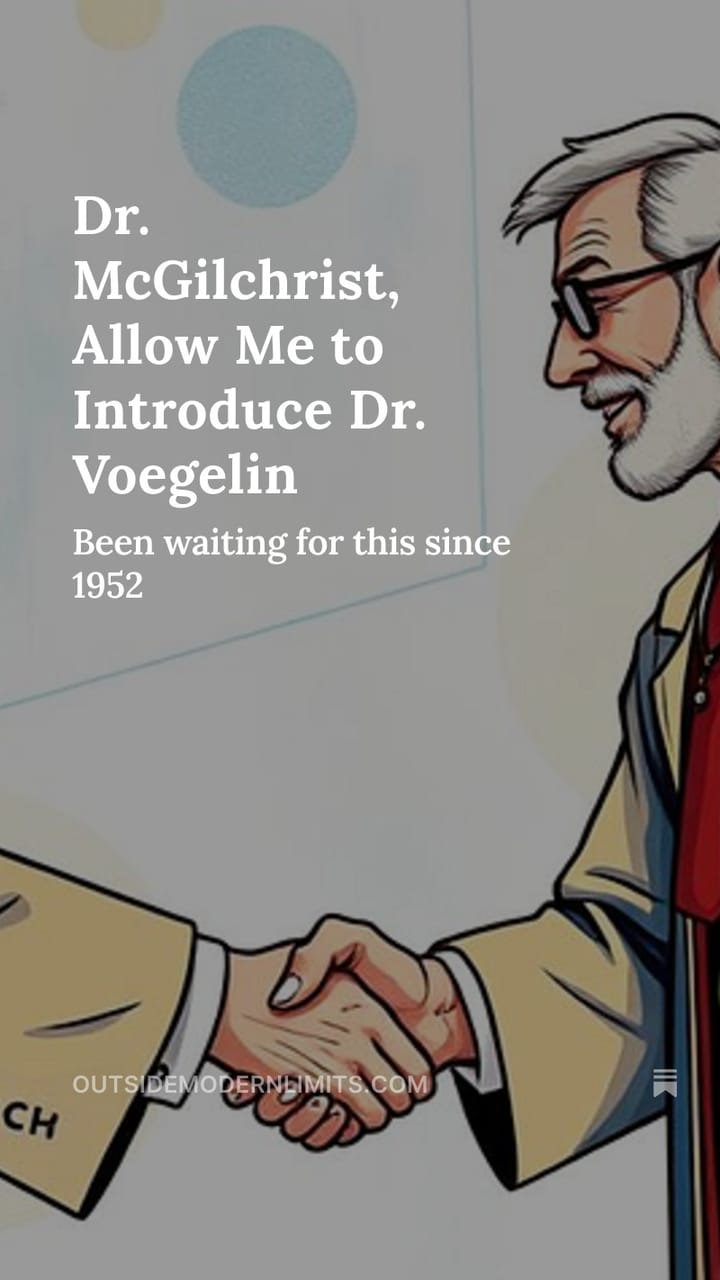Hamlet in the Metaxy
By Stephen Conlin at The Imaginative Conservative

For both William Desmond and Eric Voegelin Plato’s concept of the metaxu or metaxy is of paramount importance. Described by Plato in the Symposium and other works, metaxy means ‘between’. Voegelin describes this most fundamentally as our ‘experience of being itself, the experience of a tension between the poles of time and eternity’ (Voegelin, 2002, 328). For Desmond, ‘Being is given as the happening of the between’, a happening that is marked by ‘excess in the beginning’, excess in the middle’ and ‘excess at the end’ (Desmond, 1995, 180 – emphasis Desmond’s). Our experience is therefore a dynamic process. Voegelin again: ‘The tension of being itself, its genesis, exegesis, and interpretation, its ordering effect, its disintegration, and so on, are in fact experienced as a process. But this process occurs in the metaxy’ (Voegelin, 2002, 329).
Existence is thus generated, exceeds us, and yet is given to us; we arrive, like so many of Shakespeare’s characters, in media res, yet this is our experience of the dynamic process (and even this process must be exceeded by what Desmond calls the ‘overdetermined origin’ and for Voegelin by the ‘First Reality’ of the transcendent ground of being); but it is the process, as we dynamically live it, that which will demand from each of us an active response to whatever situation we find ourselves in; and this is what generates, so to speak, the bifurcation points that the exigencies of life constantly present us with: we must decide and act but because this process occurs in the metaxy, we, like Hamlet, find ourselves, more often than not, in highly equivocal circumstances. In this discussion I want to look at the ambiguities of the world (Denmark) of Hamlet, Hamlet’s situation in and responses to them and demonstrate, from a perspective that keeps in mind the in between, that a metaxological approach to the play may yield an understanding of it that diverges somewhat from the perhaps more usual interpretation of it “simply” as a tale about retribution as Hamlet debates with himself how to avenge his father’s murder.
In Hamlet Shakespeare presents us with a protagonist who is clearly faced with a situation that demands that he makes a choice. We are all familiar with this type problem ourselves, and the scale of them, from the merely trivial to the potentially, certainly in Hamlet’s case, tragically mortal, that can be consequent upon our decisions. This is why, in the equivocities of our metaxic condition, deciding is so difficult. Faced with dilemmas, we need time to think, and a question that the play might be seen to ask is, ‘What is the effect, and indeed affect, of thinking when there is time for this’? Clearly there are situations where decisions have to be made without the time for reflective thinking; but this is not the case for Hamlet: the whole play is about his “opportunities” for thinking – and what he does with them.
Thinking will not be straightforward affair, neither in our practise of it, nor in itself. If, as Desmond suggests, Descartes’ cogito ergo sum privileges thinking over being: ‘Descartes will derive the “I am” from the “I think”’ (Desmond, 1995, 22) this will eventually, especially via Hegel, lead to the occlusion or acknowledgement that ‘thinking is first heteroarchic before any possibility at all of its being auto-generating’ because ‘By heteroarchic I (Desmond) mean that its origin (arche) is in an other (heteros)’ (ibid. 174).
This is highly important. If the ‘I am’ is given (its due) precedence over the ‘I think’ then ‘being’ will retain its priority over thinking, which will also keep in view the acknowledgement that ‘being’ per se must originate in something ‘other’ than itself if the consequences of its alleged ‘indigence’ are to be avoided. Consequences such as the ‘circular’ reasoning of Aristotle’s thought thinking itself, so beloved of Hegel, but which quite clearly leads to an “impossible” univocalist perspective: A view that would deny, ultimately, any pluralism in its quest for a false absolute; false because that univocalist (human) perspective cannot finally “account” for itself, because it cannot be its own origin (all being, on this view, has come to be from a source beyond or transcendent to itself). Circular thought necessarily reaches a condition of aporia which, finally, fails to explain anything. Thus we cannot escape this infinite regress without the logical need of an (absolute) other or heteros.
Perhaps Hamlet would have no quarrel with any of this, he would wish to let be (and will), after all he complains ‘there’s nothing good or bad but thinking makes it so’ (Hamlet 2006, p. 466, Appendix 1, lines 11 – 12, all future references are to this edition), but this may be mere churlishness on Hamlet’s part, a consequence it may be of his sense, much manifested, of the equivocities of ‘being’. Hamlet has speculated on this ambivalence specifically, asking his fundamental question of the ground of being, ‘To be or not to be…’ (3.1.55). But what is Hamlet’s notion of ‘being’? Hamlet’s comment, quoted above, would seem indicative of his state of mind: we might suggest that surely some things must be either good or bad in themselves independently of our thinking (Plato’s ‘Good’, for example)? Otherwise the world would be a meaningless dream, utterly nihilistic without even a modicum of indigent value and thus not, in any way, a consequence of meonic fullness.[1]
It is difficult to rationally conceptualise this “absolute” indigence which is of a kind immeasurably beyond mere impoverishment, and poor beyond even need. And yet this is a condition that Hamlet comes perilously close to and perhaps finally falls victim to. Nonetheless Fortinbras’s comments at the end that Hamlet was ‘likely…to have proved most royal’ (5.2.381-2) are intriguingly ambiguous too, because ‘likely’, although it does not mean certainty, it does suggest a sense of potential that has been lost. Even the play’s final (unmetrical) line ‘Go bid the soldiers shoot’ could suggest that the ‘old’ battles that ‘Become the field’ (surely an ironic “becomingness”, intended by Shakespeare, which is not at all “comely”) will soon be raging again – just as soon as the shooting starts! Yet if indeed Shakespeare does present this ironically, and as, in fact, as ugly as any stage (or field) strewn with corpses, we might ask if Hamlet (and the reader or audience) has missed something. I would say yes, from a metaxological perspective, and that there are many clues in the play as to what, precisely, Hamlet has “missed” (and us with him, perhaps), which leads us back to a question already implied above: Is the universe of Hamlet (which, of course, is our universe too) merely indigent, or does it possess a richness, certainly as potentiality that, tragically, Hamlet and most (not all) of the other characters in the play have missed or overlooked?



